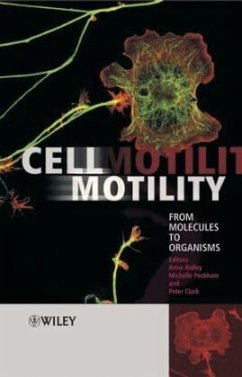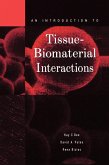This book covers the molecular basis of cellular locomotion, including the motors that drive the movement, the underlying cytoskeletal changes and the interaction of a moving cell with its neighbours. It also describes how signals from the environment, including other tissues in the body, regulate cell motility and the role this plays in many crucial activities, such as development and wound healing.
Recent advances in molecular and biophysical techniques, particularly fluorescence and live cell imaging, are revolutionizing the study of cell motility. New bioprobes not only reveal simple intracellular localization, but also contain details of post-translational modifications, conformational state and protein-protein interactions. Coupling these insights with complementary advances in genetic and biochemical methods is enabling scientists to understand the processes involved in cell motility - from molecular motors to cell movements in vivo in a range of organisms and cell types.
This book features landmark essays that provide an up to date and fascinating account of current research and concepts in cell motility.These cover the roles of molecular motors that drive movement and their interactions with the cytoskeleton as well as membrane dynamics that allow cells to change shape and to move.
Cell motility plays a key role in development - there are chapters on the genetics of cell migration, the regulation of contact repulsion in growth cones, and the progression from cell migration to cell-cell adhesion. Cell motility is directional - experts describe the molecules that regulate chemotaxis, allowing cells to migrate along pathways specified by chemical gradients. Finally, cell motility can be perturbed by mutation--metastasis occurs when cells lose their normal intercellular interactions and invade other tissue types. All these processes are regulated by signals from the environment, including other tissues in the body, and the various molecules that transmit and transduce these signals are discussed.
This book is a 'must read' for cell biologists working in a variety of fields, from development to wound healing, at all levels - post-doctoral fellows, post-graduate students and lab technicians. It is also stimulating reading for molecular and developmental biologists, biophysicists and biochemists.
Hinweis: Dieser Artikel kann nur an eine deutsche Lieferadresse ausgeliefert werden.
Recent advances in molecular and biophysical techniques, particularly fluorescence and live cell imaging, are revolutionizing the study of cell motility. New bioprobes not only reveal simple intracellular localization, but also contain details of post-translational modifications, conformational state and protein-protein interactions. Coupling these insights with complementary advances in genetic and biochemical methods is enabling scientists to understand the processes involved in cell motility - from molecular motors to cell movements in vivo in a range of organisms and cell types.
This book features landmark essays that provide an up to date and fascinating account of current research and concepts in cell motility.These cover the roles of molecular motors that drive movement and their interactions with the cytoskeleton as well as membrane dynamics that allow cells to change shape and to move.
Cell motility plays a key role in development - there are chapters on the genetics of cell migration, the regulation of contact repulsion in growth cones, and the progression from cell migration to cell-cell adhesion. Cell motility is directional - experts describe the molecules that regulate chemotaxis, allowing cells to migrate along pathways specified by chemical gradients. Finally, cell motility can be perturbed by mutation--metastasis occurs when cells lose their normal intercellular interactions and invade other tissue types. All these processes are regulated by signals from the environment, including other tissues in the body, and the various molecules that transmit and transduce these signals are discussed.
This book is a 'must read' for cell biologists working in a variety of fields, from development to wound healing, at all levels - post-doctoral fellows, post-graduate students and lab technicians. It is also stimulating reading for molecular and developmental biologists, biophysicists and biochemists.
Hinweis: Dieser Artikel kann nur an eine deutsche Lieferadresse ausgeliefert werden.
"...very well written and referenced, and many chapters contain excellent figures...this excellent volume will be a very useful reference for several years to come." ( The Quarterly Review of Biology , December 2004)
"...remarkably up to date...should prove an invaluable resource..." (Nature Cell Biology , August 2004)
"...remarkably up to date...should prove an invaluable resource..." (Nature Cell Biology , August 2004)








